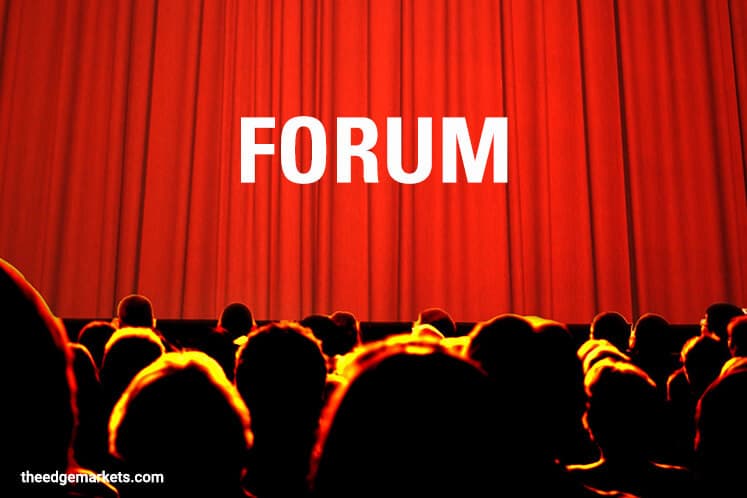
This article first appeared in Forum, The Edge Malaysia Weekly on February 19, 2018 - February 25, 2018
As if to echo the theme of the year, the recently concluded annual meeting of the World Economic Forum in Davos was unified in its statement of the problems but divided in its thoughts on to tackle them. But amid the big ideas and agenda-setting talks of the gathering, perhaps the one that will have a real bearing on the future of humanity and the nature of our civilisation is Jack Ma’s common-sense articulation. As ironic as it may sound, especially from someone who derives the full benefits of faceless technology, the free market and a capitalist instinct, his proposition rings true and should drive our thought and action, be it in human development, policy or the business domain.
It is simple enough: As we usher in the digital revolution — with artificial intelligence becoming one of the defining inventions — values and beliefs should be the main currency of our education as they are the only elements that define who we are and differentiate humans from machines. True indeed. And as the influential annual meeting has rightly pointed out, the challenges today are also made worse by the rise of xenophobic nationalism, inequality, terrorism and climate change.
The potential impact of this period of enormous challenges to human civilisation is so great that some in the West have drawn a parallel with the beginning of the European Renaissance in the 14th century, a time of extraordinary upheaval in the West that saw the redefining of the relationship between religion and society, the nature of man and states, the question of individual rights and the social contract. It was a time of great chaos and war but one that led to the birth of modern Western civilisation as we know it today.
Framing the challenges in civilisational terms, David Rothkopf, one of the foremost US policy thinkers, in his brief but pivotal thesis, The Great Questions of Tomorrow, has called on philosophers to address them within the framework of the ideas and values that have characterised Western civilisation for centuries. Hence, Ma’s enunciation of the importance of values will resonate with the global community.
And therein lies the dilemma for the Muslim world. Faced with its own set of predicaments, which set of values should we embrace? How do we inculcate the right values and beliefs in our education? The simple answer is to adopt wholesale what the West has got to offer. After all, it was its values and ideas and all its external manifestations that have shaped and influenced our thinking and action in many ways.
But a society whose identity is defined by religion should seek to discover and offer its own framework for action. This is where the knowledge and wisdom within the tradition of Islam become important as a source of an alternative vision.
From the early days of the post-colonial world — when the ideas of reform began to take root in Muslim society — until today, perhaps the one scholar who has produced a comprehensive corpus of knowledge on not just Islamic thought but also an agenda for practical action is Syed Muhammad Naquib Al Attas. I say “perhaps” because my knowledge of Islam is limited to college-level education and my exposure to the various strands of thought in Islam is cursory and basic, to say the least.
But as someone involved in the daily affairs of socio-economic policymaking and execution, I am in no doubt that his ideas, in their preliminary form contained in his key volumes — Islam and Secularism and Prolegomena to the Metaphysics of Islam — offer the most sophisticated and lasting solutions to the challenges in Muslim society and deserve a platform to fix what the World Economic Forum termed the fractured world.
What sets his ideas apart is the depth of his analysis. Unlike most contemporary Islamic scholars, he does not concern himself with political, economic or social change per se, but with what should begin with addressing the problem of the worldview, a key concept that plays an important role in shaping and influencing our thought and action.
His emphasis is on knowing the correct worldview of some of the most fundamental questions — the meaning and role of religion, the nature of man and happiness, the essence of the universe and the concept of knowledge — against those understood in the Western tradition. His extensive analysis of the development of secularism as a worldview in Western thought and civilisation, and his conception of the worldview of Islam grounded in the certainty of knowledge in Islamic tradition, provide two contrasting visions for Muslim society. His two important writings serve as the philosophical blueprint for what constitutes a worldview of Islam and what is not.
It is the values and beliefs driven by this worldview that we in the Muslim world should seek to understand and put in their proper place in our education system, so it shapes our thinking and action in our pursuit of development and nation-building — and not those as perhaps understood by Jack Ma.
Nazim Rahman is CEO of Pelaburan MARA Bhd and was a Fulbright Fellow in the US. He is an alumnus of the Worldview of Islam programme run by the Centre for Advanced Studies of Islam, Science and Civilisation UTM, HAKIM and Ta’dib International.
Save by subscribing to us for your print and/or digital copy.
P/S: The Edge is also available on Apple's AppStore and Androids' Google Play.